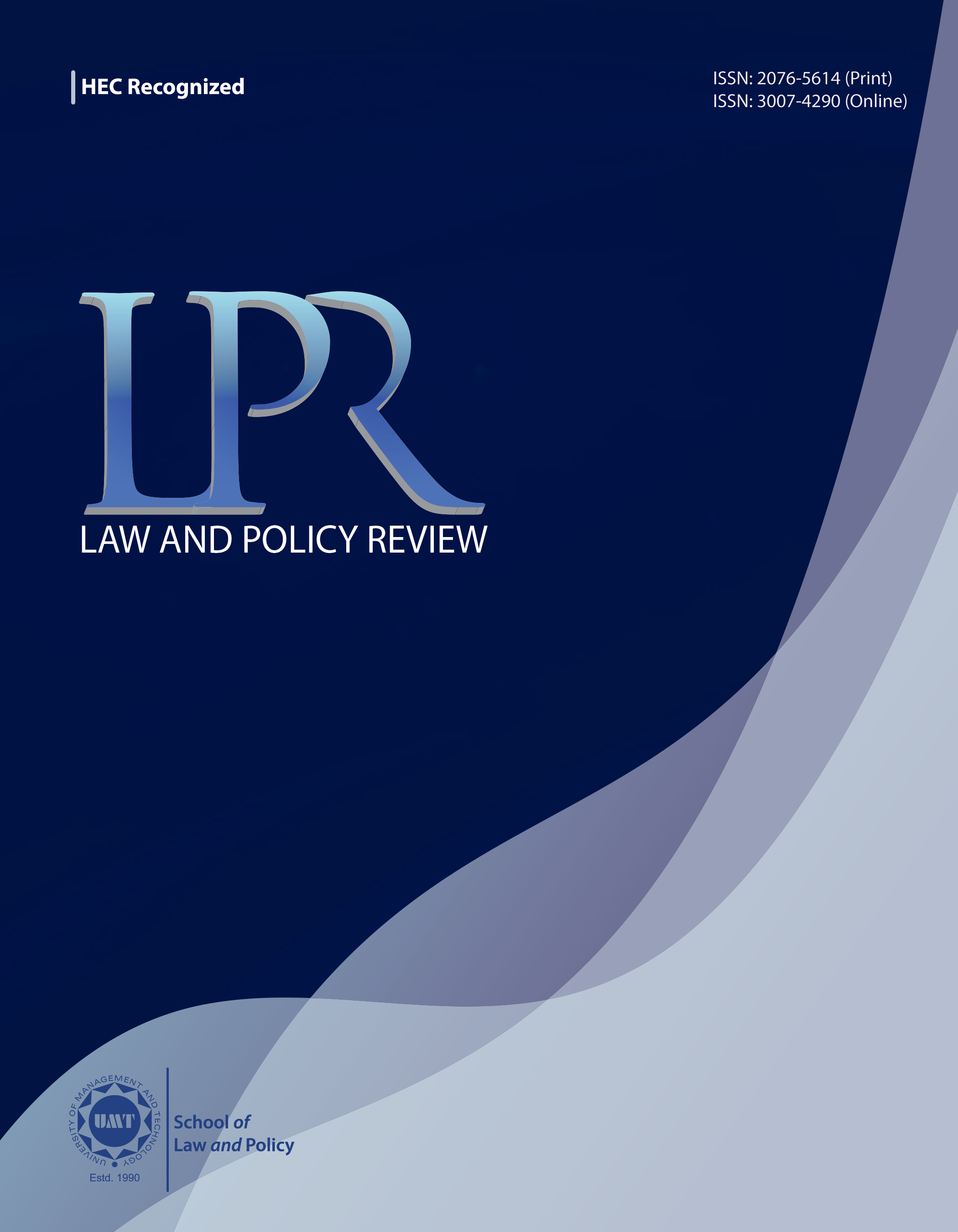Methods of Judicial Appointments in Different Jurisdictions: Lessons for Pakistan
Abstract
 Abstract Views: 0
Abstract Views: 0
This paper examines the contemporary mechanism of judicial appointments in Pakistan, focusing on the artificial seniority-versus-merit binary and the power of the Chief Justice of Pakistan (CJP) to appoint judges. It discusses various models of judicial appointments, including single-body mechanisms, representative appointments, professional appointments, cooperative appointments, judicial elections, commission or council appointments, and blended methods. While the commission or council mode proved successful in South Africa during its transition from white-minority rule to a constitutional democracy, it has not been yielded similar results in Pakistan. The Judicial Commission of Pakistan (JCP) has faced criticism for its lack of transparency, manipulation of meetings, pre-pondering role of the chairman, court packing, and a borrowed bureaucrat as secretary of the commission. Drawing on lessons from South African experience, the paper recommends reforms to transform the judicial appointments process in Pakistan.
Downloads
References
Bulmer, E. (2017). Judicial appointments. International IDEA Publications.
European Commission for Democracy through Law (Venice Commission). (1997). The composition of constitutional courts (Science and Technique of Democracy No. 20) [Report]. Council of Europe. https://www.venice.coe.int/webforms/documents/default.aspx?pdffile=CDL-STD(1997)020-e
Gee, G., & Rackley, E. (Eds.). (2017). Debating judicial appointments in an age of diversity. Routledge.
Ginsburg, T. (2009). Judicial appointments and judicial independence. Comparative Constitutions Project. http://comparativeconstitutionsproject.org/files/judicial_appointments.pdf
Judicial Commission of Pakistan. (n.d.). Judicial commission of Pakistan rules, 2010. https://www.supremecourt.gov.pk/downloads_judgements/all_downloads/judicial_commission/Rules,2010.pdf
Judiciary RSA. (2023, April 20). Judicial service commission interviews: 20 April 2023 [Video]. YouTube. https://www.youtube.com/watch?v=7UwC6RajhRw
Khan, F. S. (2023, June 2). How to appoint a judge. Dawn. https://www.thenews.com.pk/print/1076242-how-to-appoint-a-judge
Law Library of Congress. (2016, May 2). How judges are selected in Germany. In Custodia Legis. https://blogs.loc.gov/law/2016/05/how-judges-are-selected-in-germany/The Library of Congress
Office of the Chief Justice of Republic of South Africa. (n.d.). About the JSC. Retrieved on July 14, 2023, from https://www.judiciary.org.za/index.php/judicial-service-commission/about-the-jsc
Omer, R. (2022, August 6). Paterfamilias? Dawn. https://www.dawn.com/news/1703522
Pásara, L. (2015, March 5). Judicial elections in Bolivia: An unprecedented event. Due Process of Law Foundation. https://back.dplf.org/en/resources/judicial-elections-bolivia-unprecedented-event
Raja, S. A. (2021a, August 8). Credibility and judicial appointments. Dawn. https://www.thenews.com.pk/print/874783-credibility-and-judicial-appointments
Raja, S. A. (2021b, July 19). Seniority and judicial appointments. Dawn. https://www.thenews.com.pk/print/865957-seniority-and-judicial-appointments
Republic of South Africa. (1996). The constitution of the republic of South Africa. https://www.gov.za/documents/constitution/constitution-republic-south-africa-1996-1
Roth, L. (2012). Judicial appointments. National Library of Australia. https://catalogue.nla.gov.au/Record/6101253
Sengupta, A., & Sharma, R. (Ed.). (2017). Appointment of judges to the Supreme Court of India: Transparency, accountability, and independence. Oxford University Press.
Sigamony, T. J. (2024, June 8). SC Acts: Bar councils’ plea to apex court. Business Recorder. https://www.brecorder.com/news/40246541
The Judicial Service Commission. (n.d.). Justice/Resources/FAQs. Accessed on June 17, 2023, https://www.justice.gov.za/faq/faq-jsc.html
Vakeel Online. (2021, September 27). ‘Does seniority matter for judicial appointments? [Video]. Facebook. https://www.facebook.com/watch/?v=984037555778784
Copyright (c) 2025 Yasir Rashid Khan, Naeem Ullah Khan

This work is licensed under a Creative Commons Attribution 4.0 International License.
LPR follow an open-access publishing policy and full text of all published articles is available free, immediately upon publication of an issue. The journal’s contents are published and distributed under the terms of the Creative Commons Attribution 4.0 International (CC-BY 4.0) license. Thus, the work submitted to the journal implies that it is original, unpublished work of the authors (neither published previously nor accepted/under consideration for publication elsewhere). On acceptance of a manuscript for publication, a corresponding author on the behalf of all co-authors of the manuscript will sign and submit a completed the Copyright and Author Consent Form.





